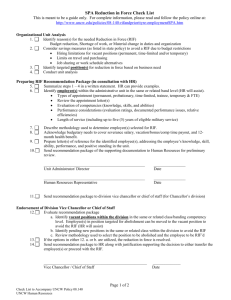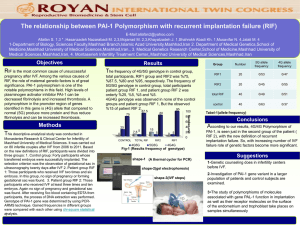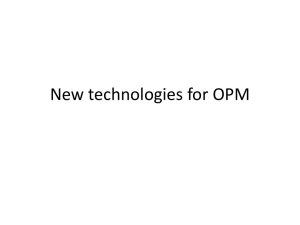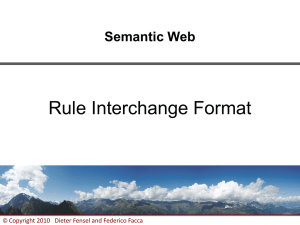- Ivan4Naps
advertisement
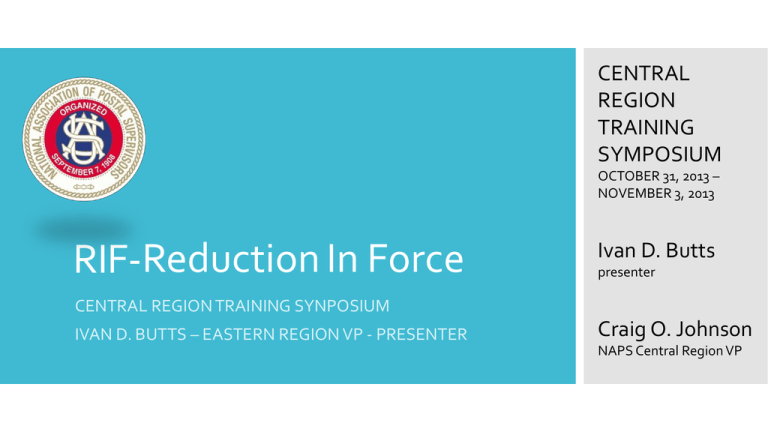
CENTRAL REGION TRAINING SYMPOSIUM OCTOBER 31, 2013 – NOVEMBER 3, 2013 RIF-Reduction In Force Ivan D. Butts presenter CENTRAL REGION TRAINING SYNPOSIUM IVAN D. BUTTS – EASTERN REGION VP - PRESENTER Craig O. Johnson NAPS Central Region VP WHAT IS RIF? A procedure used to terminate occupied employment positions caused by lost funding, change of work requirements, or the reorganization of a department or business operation. Layoffs may be temporary or permanent. CENTRAL REGION TRAINING SYMPOSIUM OCTOBER 31, 2013 – NOVEMBER 3, 2013 CFR part 351 (RIF) procedures Ivan D. Butts presenter Craig O. Johnson NAPS Central Region VP KEY POINTS OF RIF LAW § 351.201 Use of regulations. (a)(2) Each agency shall follow this part when it releases a competing employee from his or her competitive level by furlough for more than 30 days, separation, demotion, or reassignment requiring displacement, when the release is required because of lack of work; shortage of funds; insufficient personnel ceiling; reorganization; the exercise of reemployment rights or restoration rights; or reclassification of an employee's position die to erosion of duties when such action will take effect after an agency has formally announced a reduction in force in the employee's competitive area and when the reduction in force will take effect within 180 days. KEY POINTS OF RIF LAW (a) This subpart is applicable when the work of one or more employees is moved from one competitive area to another as a transfer of function regardless of whether or not the movement is made under authority of a statute, Executive order, reorganization plan, or other authority. (b) In a transfer of function, the function must cease in the losing competitive area and continue in an identical form in the gaining competitive area ( i.e., in the gaining competitive area, the function continues to be carried out by competing employees rather than by noncompeting employees). KEY POINTS OF RIF LAW (a) Before a reduction in force is made in connection with the transfer of any or all of the functions of a competitive area to another continuing competitive area, each competing employee in a position identified with the transferring function or functions shall be transferred to the continuing competitive area without any change in the tenure of his or her employment. KEY POINTS OF RIF LAW § 351.404 Retention register. (a) When a competing employee is to be released from a competitive level under this part, the agency shall establish a separate retention register for that competitive level. The retention register is prepared from the current retention records of employees. Upon displacing another employee under this part, an employee retains the same status and tenure in the new position. KEY POINTS OF RIF LAW Each agency shall determine the retention standing of each competing employee on the basis of the factors in this subpart and in subpart E of this part. § 351.501 Order of retention—competitive service. (1) By tenure group I, group II, group III; and (2) Within each group by veteran preference subgroup AD, subgroup A, subgroup B; and (3) Within each subgroup by years of service as augmented by credit for performance under §351.504, beginning with the earliest service date. KEY POINTS OF RIF LAW § 351.402 Competitive area. (a) Each agency shall establish competitive areas in which employees compete for retention under this part. KEY POINTS OF RIF LAW § 351.205 Authority of OPM. (a) The Office of Personnel Management may establish further guidance and instructions for the planning, preparation, conduct, and review of reductions in force. OPM may examine an agency's preparations for reduction in force at any stage. When OPM finds that an agency's preparations are contrary to the express provisions or to the spirit and intent of these regulations or that they would result in violation of employee rights or equities, OPM may require appropriate corrective action. KEY POINTS OF RIF LAW § 351.603 Actions subsequent to release from competitive level. (a) An employee reached for release from a competitive level shall be offered assignment to another position in accordance with subpart G of this part. If the employee accepts, the employee shall be assigned to the position offered. If the employee has no assignment right or does not accept an offer under subpart G, the employee shall be furloughed or separated. CENTRAL REGION TRAINING SYMPOSIUM OCTOBER 31, 2013 – NOVEMBER 3, 2013 RIF AVOIDANCE Ivan D. Butts presenter Craig O. Johnson NAPS Central Region VP WHAT IS RIF AVOIDANCE? There are numerous ways to minimize the need for a RIF as a result of management’s reshaping efforts. They are not in order of preference. Workforce Reshaping Operations Handbook • Freeze Hiring and Promotion Actions. • Furlough. • Reassign Surplus Employees to Other Positions. • Train Employees for Other Positions. • Voluntary Change to Lower Grade. • Voluntary Early Retirement Authority. • Voluntary Separation Incentive Payment. Human Resource’s Role and Responsibilities • Establishing the HR office’s RIF team • Taking preliminary actions • Preparing and using retention registers • Determining rights to other positions • Issuing RIF notices • Counseling employees on procedures and options NOTE ON VERA After OPM approves a VERA authority, the agency, based on management considerations, may subsequently modify the closing date for the VERA window period and/or revise the number of employees who may retire under the authority. OPM’s approval letter to the agency authorizing VERA covers options to manage the early retirements. OPM’s website at http://www.opm.gov/Reduction_In_Force/general/rifguide.asp provides additional information on VERA. NOTE ON FURLOUGH An agency may temporarily reduce personnel costs by furloughing employees. A furlough is the placement of an employee in a temporary non-duty, non-pay status because of lack of work or funds, or other non-disciplinary reasons. A furlough expected to last less than 30 continuous calendar days or 22 discontinuous workdays (e.g., one workday per week for 25 weeks) is carried out under 5 CFR part 752 (adverse action) procedures. A furlough that is expected to last more than 30 continuous calendar days or 22 discontinuous workdays (e.g., one workday per week for 25 weeks) is effected under CFR part 351 (RIF) procedures. NOTE ON RETENTION TENURE GROUP Competitive Service Tenure Groups. The RIF regulations define three competitive service tenure groups. 1. Group I includes each permanent employee whose appointment carries no restriction or condition such as conditional, indefinite, specific time limit, or trial period. 2. Group II includes each employee serving a trial period; or whose tenure is equivalent to a career-conditional appointment in the competitive service in agencies having these appointments. 3. Group III includes each employee with indefinite tenure (an appointment without a specific time limit, but not actually or potentially permanent); under an appointment with a specific time limitation of more than 1 year; or who is currently serving under a temporary appointment limited to 1 year, but has completed one year of current continuous service under a temporary appointment with no break in service of 1 workday or more. NOTE ON VETERANS PREFERENCE Tenure Subgroups. The RIF regulations define three tenure subgroups. Within each of the three tenure groups on a retention register, the agency places the names of competing employees in veterans’ preference tenure subgroups. The same tenure subgroups are used for positions filled under competitive and excepted appointments. 1. Subgroup AD includes each veterans’ preference-eligible employee who has a compensable service-connected disability of 30 percent or more. 2. Subgroup A includes each veterans’ preference-eligible employee not in subgroup AD, including all employees eligible for “derivative preference” under section 2108(3)(D)-(G) of title 5, United States Code. 3. Subgroup B includes each employee not eligible for veterans’ preference under the RIF regulations. NOTE ON RIF Service Credit for Performance Each employee receives additional RIF service credit for performance based upon the average of the employee’s three most recent ratings of record received during the 4year period prior to the date that the agency either issues a specific RIF notice or freezes ratings before issuing specific RIF notices 1. 20 additional years of service for each rating of record of Outstanding or equivalent summary 2. 16 additional years of service for each rating of record of Exceeds Fully Successful or equivalent summary 3. 12 additional years of service for each rating of record of Fully Successful or equivalent summary WHY MUST YOU ALWAYS FIGHT NONCONTRIBUTOR RATINGS? The RIF regulations do not provide assignment rights to an employee who has a current annual performance rating of Unacceptable or equivalent.


